Related Research Articles

Sternhalma, commonly known as Chinese checkers or Chinese chequers, is a strategy board game of German origin that can be played by two, three, four, or six people, playing individually or with partners. The game is a modern and simplified variation of the game Halma.

Ludo is a strategy board game for two to four players, in which the players race their four tokens from start to finish according to the rolls of a single die. Like other cross and circle games, Ludo is derived from the Indian game Pachisi. The game and its variations are popular in many countries and under various names.
The Computer Olympiad is a multi-games event in which computer programs compete against each other. For many games, the Computer Olympiads are an opportunity to claim the "world's best computer player" title. First contested in 1989, the majority of the games are board games but other games such as bridge take place as well. In 2010, several puzzles were included in the competition.

Backyard cricket, also known as bat ball, street cricket, beach cricket, corridor cricket, garden cricket, gully cricket and box cricket, is an informal variant of cricket. It is typically played in various non-traditional venues such as gardens, backyards, streets, parks, carparks, beaches, and any area not specifically designed for the sport. In backyard cricket, gully cricket is an informal form of cricket played in India, Bangladesh, Pakistan, and Sri Lanka.

Patolli or patole is one of the oldest known games in America. It was a game of strategy and luck played by commoners and nobles alike. It was reported by the conquistadors that Moctezuma Xocoyotzin often enjoyed watching his nobles play the game at court.
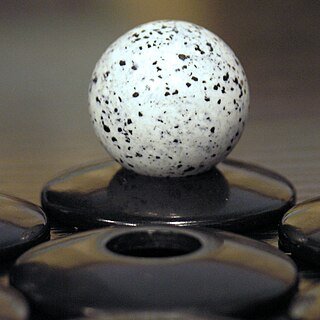
ZÈRTZ is the third game in the GIPF Project of seven abstract strategy games. The game features a shrinking board and an object that promotes sacrifice combinations. It is impartial: since neither player owns on-board pieces, maintaining the initiative is of fundamental importance.

A marble is a small spherical object often made from glass, clay, steel, plastic, or agate. They vary in size, and most commonly are about 13 mm in diameter. These toys can be used for a variety of games called marbles, as well being placed in marble runs or races, or created as a form of art. They are often collected, both for nostalgia and for their aesthetic colors.
Cricket is a multi-faceted sport with different formats, depending on the standard of play, the desired level of formality, and the time available. One of the main differences is between matches limited by time in which the teams have two innings apiece, and those limited by number of overs in which they have a single innings each. The former, known as first-class cricket if played at the senior level, has a scheduled duration of three to five days ; the latter, known as limited overs cricket because each team bowls a limit of typically 50 overs, has a planned duration of one day only. A separate form of limited overs is Twenty20, originally designed so that the whole game could be played in a single evening, in which each team has an innings limited to twenty overs.

Truco, a variant of Truc, is a trick-taking card game originally from Valencia and the Balearic Islands, popular in South America and Italy. It is usually played using a Spanish deck. Two people may play, or two teams of two or three players each.
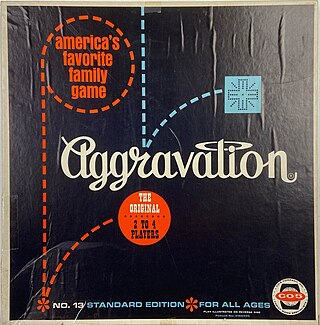
Aggravation is a board game for up to four players and later versions for up to six players, whose object is to be the first player to have all four playing pieces reach the player's home section of the board. The game's name comes from the action of capturing an opponent's piece by landing on its space, which is known as "aggravating". The name was coined by one of the creators, Louis Elaine, who did not always enjoy defeat.
Traditional Filipino games or indigenous games in the Philippines are games that are played across multiple generations, usually using native materials or instruments. In the Philippines, due to limited resources for toys, children usually invent games that do not require anything but players. There are different kinds of Filipino traditional games which are well-suited for kids, and the games also stand as one of the different cultural and traditional games of the Philippines. Due to the variety of skills used in these games, they serve an important purpose in the physical and mental development of Filipino children. These games are also an important part of Filipino culture.
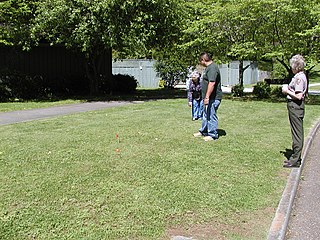
Cherokee marbles, or five hole is a traditional game among the Cherokee people of the United States, in which players roll small stone balls between five shallow pits dug into a playing field. Today, the game is commonly played with billiard balls. The game may be played in individual or team play, and in this century, has been introduced into the curricula of students attending schools in the Cherokee Nation. There is also a national tournament held annually during the Cherokee National Holiday.
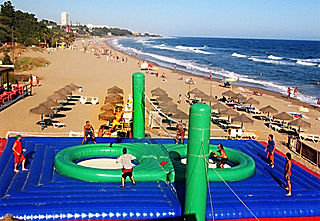
Bossaball is a team sport that originated in Brazil and was conceptualised by Belgian Filip Eyckmans in 2004. Bossaball is a ball game between two teams, combining elements of volleyball, football, and gymnastics with music into a sport. It is played on an inflatable court featuring a trampoline on each side of the net. The trampolines allow the players to bounce high enough to spike the ball over the net.
Traditional games of Andhra Pradesh, like many other traditional games played in India, involve games which are played mostly by children. These games may also be enjoyed by other people of any age, as it reminds them of their childhood. Despite the advent of computers and technology, with children preferring to spend their times indoors, these games are still very popular in the Andhra Pradesh. They are also played in great and small towns all over India and Pakistan, especially in Andhra Pradesh, Tamil Nadu, Punjab, as well as Cambodia and Italy..

The following is a glossary of terms used in card games. Besides the terms listed here, there are thousands of common and uncommon slang terms. Terms in this glossary should not be game-specific, but apply to a wide range of card games played with non-proprietary packs. It should not include terms solely related to casino or banking games. For glossaries that relate primarily to one game or family of similar games, see Game-specific glossaries.
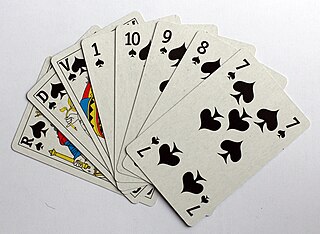
Bête, la Bête, Beste or la Beste, originally known as Homme or l'Homme, was an old, French, trick-taking card game, usually for three to five players. It was a derivative of Triomphe created by introducing the concept of bidding. Its earlier name gives away its descent from the 16th-century Spanish game of Ombre. It is the "earliest recorded multi-player version of Triomphe".
Trekort, tre-kort or, in Swedish, also trikort, is an old card game of Danish origin for four or five players that was usually played for money. It was also known in Sweden, where it developed into the variant of knack. The name trekort is also loosely used to describe related three-card games such as Swedish köpknack. The name means "three cards" and may therefore be related to German Dreiblatt.

La plaquita or la placa is a bat-and-ball game played in the Dominican Republic with many similarities to cricket.
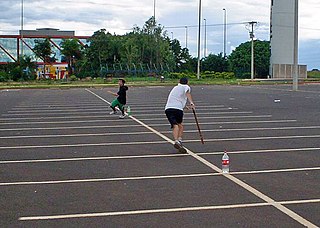
Bete-ombro, also known as bets, tacobol, pau na lata, or taco, is a Brazilian bat-and-ball game closely related to cricket. Two teams of two players each take turns batting and fielding. The batting team runs between two wickets, which are generally plastic bottles, while the fielding team can run out batters by hitting a wicket with the ball before the closest batter reaches it. Bowled, stumped, and caught are other forms of dismissal.

India has several traditional games and sports, some of which have been played for thousands of years. Their popularity has greatly declined in the modern era, with Western sports having overtaken them during the British Raj, and the Indian government now making some efforts to revive them. Many of these games do not require much equipment or playing space. Some of them are only played in certain regions of India, or may be known by different names and played under different rules and regulations in different regions of the country. Many Indian games are also similar to other traditional South Asian games.
References
- 1 2 "Popular Children's Games". basilio.fundaj.gov.br. Retrieved 2022-11-26.
- ↑ "Betes - Bete Ombro - Taco - Disciplina - Educação Física". www.educacaofisica.seed.pr.gov.br. Retrieved 2022-11-26.
- 1 2 Leonard, John. "Brazilian Kids Games to Play in Class | Synonym". classroom.synonym.com. Retrieved 2022-11-26.